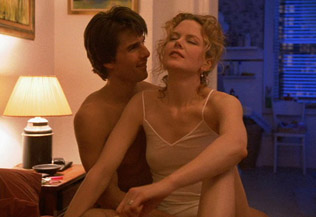Are You With Us?:
Eyes Wide Shut
By Ryan Mazie
July 29, 2010
Mr. and Mrs. Cruise’s third and final (since they got divorced almost exactly two years later) pairing was their least financially successful, but most masterful. When I see the name Tom Cruise attached to a project, even if it looks sub-par (I’m looking at you Knight and Day), means that it will at least be an emotionally satisfying experience whether he is trying to make you laugh while dancing around in his underwear, make your knuckles-white while defusing a bomb, cry while chasing the girl who he had all along at “hello”, or making you think about marriage, love and fidelity. While in the back of your mind Tom Cruise onscreen will always be Tom Cruise - especially nowadays after his couch-jumping scientology media fiasco he has found himself in - he certainly was doing some Oscar fishing in 1999. Coming off of five films in a row that grossed over $100 million, Cruise broke the streak with Eyes Wide Shut and Magnolia, which was the film that ultimately garnered him the nomination for Best Supporting Actor. However, I feel he truly shines here, leading almost every scene, portraying crushing defeat and testosterone-filled exhilaration just in longing glances, one of my favorite Kubrick trademarks that is in full swing here. Cruise embodies Bill, who acts on his compulsions, in stark opposition to Kidman’s character who thinks about infidelity but never acts on it, at least not on film. Yet, in an almost comical moment, as soon as he is about to have sex with another woman, he is interrupted. Cruise balances the surreal nature of the long night’s events in New York City and its surroundings with the grounded, emotional foundation of marriage for the film.
Kubrick asks if love, trust, promises, and marriage equal fidelity. Is there a difference between desire so intense that if the opportunity arose you would take it and the actual act itself? And is staying committed really just done out of consideration for the other? Strangely, the most lucid argucission (a new word I just made to describe how almost every conversation is an insightful argument and discussion) occurs when Bill and Alice are high on pot. In this scene, Kidman truly highlights her acting chops. Her stare is almost as biting as her words. Not getting a Leading Actress nomination from the Academy was truly a huge snub on her behalf, not to mention Kubrick missing out on a chance for Best Director (something he was nominated four times prior, but shockingly never won).
At a long two hours and 39 minutes, a movie that could have been drudging is set at a perfect pace to keep the dream-like aspect of the film (hey, girls always said that Tom is dreamy). Each long scene can be a movie itself with a dramatic arc, making the brief interludes feel somewhat out of place. And even though this is truly Cruise’s and Kidman’s film, Kubrick, like any director, draws great performances from his supporting cast. Famed director Sydney Pollack, who directed Cruise in The Firm, makes one of his less-common acting appearances as the power elite Dr. Victor Ziegler (Harvey Keitel was originally cast and even shot scenes but dropped out due to other project obligations), whose twisting of the truth makes him either a hero trying to be redeemed, or for my money one of film’s most underrated villains. Todd Field, another Academy-approved director (Little Children, a little seen gem), who makes an acting appearance as Bill’s old Med-school-dropout-turned-piano-player friend, kicks the movie to the next level, introducing Bill to a party that turns out to be a gigantic orgy – one of the most controversial aspects of the film.
Continued:
1
2
3
4
|
|
|
|

![]() Tweet
Tweet
![]() Print this column
Print this column



